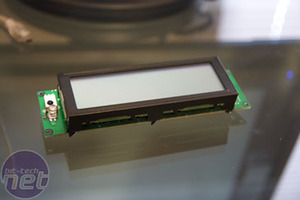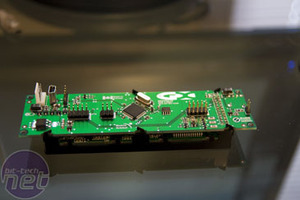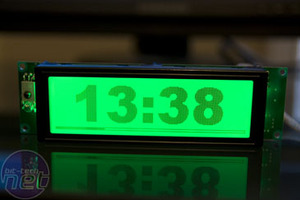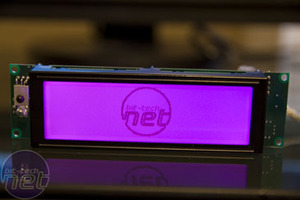
Matrix Orbital GX Typhoon
Manufacturer: Matrix OrbitalUK Price (as reviewed): £65.00 (inc. VAT) (without remote) / £75.00 (inc. VAT) (with remote)
US Price (as reviewed):
$99.95 (ex. Tax) (without remote) / $114.95 (ex. Tax) (with remote)
Introduction
If you look through the annals of modding history, the tried and true LCD display is one of the quintessential additions to a case. Whether it is mounted in a drive bay, on a side panel or on the top of the case, the handy digital readout is always a welcome sight.So why has it been two years since we last had a new release?
Some would say that it's because LCD technology, at least in micro-displays, is pretty well maxed out. We've done what we can. You can get a display in several colour combinations, graphical abilities, and brightnesses. You can choose your size and shape, connection, and plug it in. That's really all they can do...
...unless you're a company like Matrix Orbital, which has spent the past two years designing what it sees as the next big "staple" in modding. And the first part of that plan is the new GX line of products that we've been privy to for nearly the whole time.
We've kept our mouths shut, of course, because the display isn't just the display – it's the hub of a modular system that was designed to be able to control everything from fans to lighting to remote controls to pretty much anything else that could be powered. But we're finally getting close to the more official release (a couple of our modders have had the displays for a few months now thanks to Matrix Orbital's great support for the modding scene), and we think it's time to look into the first part of this system – the GX "Typhoon" display.
The GX Display
At its base, the GX Typhoon is exactly as it seems – a 240 x 64 line LCD display.The Typhoon and Typhoon MCE are identical – the only difference is in the included remote control with the MCE version. The non-MCE still has an IR receiver, so if you already have an MCE remote then you can save a few bucks.
For those of you who are building HTPC cases, this could be a dream come true – the display features an integrated IR receiver that works as a standard MCE device, so it can receive signals from both MCE remotes and keyboards. Of course, other software could actually make it do a bit more – Matrix Orbital nicely decoupled the IR setup at the driver level to allow for MCE to function, which means you can also grab the signal from any of the multitude of IR-capable programs.
The IR port is the only distinguishing feature on the front, but the back has quite a collection of pin-outs and headers. These are designed to allow you to install “add-ons” onto the display. For instance, one that’s set for release within the next couple months is a digital baybus for controlling fanspeeds. Also in the works are light controllers, programmable keypads and a variety of other peripheral controls.
Allowing things like the baybus to be on a separate PCB from the LCD itself offers a two-fold benefit. First, it's not forcing someone to purchase a component that they don't need – if you were looking for a cool display with a detached and movable keypad, you're not spending the money for a feature you have no use of. Second and more important, it means the LCD doesn't have to be limited to the control chips and power regulation that it has currently. The PCB only needs to worry about the LCD – so it doesn't have to worry about the dangers of power regulation of a baybus or touch-sensitive switches of a keypad or be able to calculate the GPM of your watercooling all at once.
By having this modular system in place, users can "buy in" to the features that they need while at the same time getting a better part for each feature. Baybuses can be built to handle higher voltages, while keypads can be one (or more!) of several options that are movable around the case.
Modularity is great, but it's useless if the display itself isn't useful. Fortunately, where the display starts to shine (as you'll see over the following pages) is in how it displays – the GX Typhoon standard model features a tri-colour LED backlight that makes it possible to have pretty much any colour you like. Want purple? Sure! Green for your next mod? Why not! The colour can even change with every (easily made or edited) screen that the display shows.
But how well does it work? Well, that's been the catch in so many LCDs... so read on to see how the GX Typhoon fares.

MSI MPG Velox 100R Chassis Review
October 14 2021 | 15:04












Want to comment? Please log in.